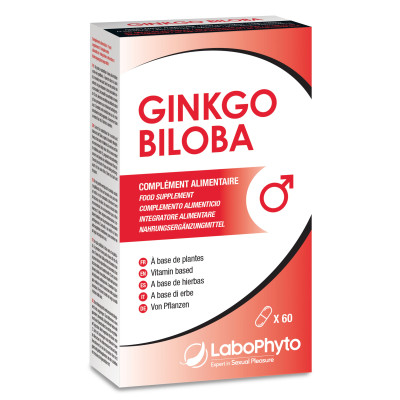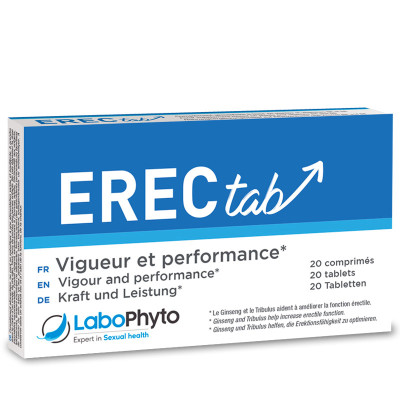.jpg)
All about Ginkgo Biloba
Reading time: 30 minutes
Ginkgo biloba, or maidenhair, is a tree native to China that has been cultivated for thousands of years for various uses. As it is the only surviving member of an ancient order of plants, it is sometimes referred to as a living fossil. While its leaves and seeds are often used in traditional Chinese medicine, modern research focuses primarily on ginkgo extract, which is made from the leaves.
Ginkgo supplements are associated with several health claims and uses, most of which focus on brain function and blood flow, which may benefit your sex life.
What is Ginkgo Biloba

Ginkgo Biloba is the oldest tree species whose specimens are still identical to their ancestors . It already populated the planet 300 million years ago. Thanks to a few individuals found in ancient Chinese temples, it has been able to relocate it all over the world, especially as an ornamental tree.
With an exceptional resistance to environmental stresses, it can live up to 1000 years and reach 40 to 50 m in height . It seems to resist pollution well and adapt easily to urban environments. Its leaf is used to treat various symptoms.
Ginkgo-Biloba, a very honored tree in Asia, is an excellent vasodilator for both the brain and the genitals. In particular, it accelerates cerebral blood flow, contributes to memory formation and improves blood flow, especially in the private parts.
In Japan, the almond of the roasted ginkgo seed was recommended as a male aphrodisiac to provide power and tone in the lower abdomen . It can, for example, be combined with ginseng to improve the effects on memory formation but also for libido.
Gingko biloba is therefore perfect in case of sexual dysfunction, even when taking antidepressants, it helps to improve erection so that it is more durable and firmer . It also contributes to the improvement of blood flow in small vessels, increases tissue oxygenation, protects blood vessels from radical damage and restores the elasticity and tone of the entire circulatory system.
Gingko biloba also has interesting properties as a conditioner, antioxidant, anti-aging and anti-disease.
What are the benefits of Ginkgo Biloba?

Contains powerful antioxidants
Ginkgo's antioxidant content may be behind many of its health claims.
This is because Ginkgo contains high levels of flavonoids and terpenoids , which are compounds known for their powerful antioxidant effects.
Antioxidants fight or neutralize the harmful effects of free radicals.
Free radicals are highly reactive particles that are produced in the body during normal metabolic functions, such as the conversion of food into energy or detoxification.
However, they also have the potential to damage healthy tissue, contributing to accelerated aging and the development of disease.
Research on the antioxidant effects of ginkgo is promising. Nevertheless, it is not yet known exactly how it works and how effective it is in the treatment of certain diseases.
May help fight inflammation
Inflammation is part of the body's natural response to injury or invasion by a foreign substance.
In the inflammatory response, various components of the immune system are recruited to fight the foreign invader or heal the injured area.
Some chronic diseases trigger an inflammatory response even in the absence of disease or injury. Over time, this excess inflammation can cause permanent damage to the body's tissues and DNA.
Years of animal research show that ginkgo extract can reduce markers of inflammation in human and animal cells in various disease states.
Some specific conditions in which ginkgo extract has been shown to reduce inflammation include:
- arthritis
- Irritable bowel disease (IBD)
- Cancer
- heart disease
- Stroke
While these data are encouraging, human studies are needed before any firm conclusions can be drawn about ginkgo's role in treating these complex diseases.
Improves circulation and heart health
In traditional Chinese medicine, ginkgo seeds were used to open energy "channels" to different organ systems, including the kidneys, liver, brain, and lungs.
Ginkgo's apparent ability to increase blood flow to different parts of the body may be behind many of its supposed benefits.
A study in people with heart disease who took a ginkgo supplement found an immediate increase in blood flow to several parts of the body. This phenomenon has been attributed to a 12% increase in circulating levels of nitric oxide, a compound responsible for the dilation of blood vessels.
Similarly, another study showed the same effect in older adults who were treated with ginkgo extract.
Other research also points to ginkgo's protective effects on heart health, brain health, and stroke prevention. There are multiple potential explanations for this, one of which may be the anti-inflammatory compounds found in the plant.
More research is needed to fully understand how ginkgo affects circulation and heart and brain health.
Reduces symptoms of psychiatric disorders and dementia
Ginkgo has been repeatedly evaluated for its ability to reduce anxiety, stress, and other symptoms associated with Alzheimer's disease and age-related cognitive decline .
Overall, research findings are conflicting in this area.
Some studies show a marked reduction in the rate of cognitive decline in people with dementia who use ginkgo, but others fail to replicate this result.
A review of 21 studies found that when used alongside conventional medicine, ginkgo extract can increase functional abilities in people with mild Alzheimer's disease.
Another review assessed four studies and found a significant reduction in a spectrum of symptoms associated with dementia when ginkgo was used for 22 to 24 weeks.
These positive results may be related to the role that ginkgo may play in improving blood flow to the brain, especially in relation to vascular types of dementia.
Overall, it's too early to definitively say or refute ginkgo's role in treating dementia, but recent research is beginning to shed some light on this piece.
Improves brain function and well-being
There is speculation that ginkgo may improve brain function in healthy individuals .
A handful of small studies support the idea that ginkgo supplementation can improve mental performance and perceived well-being.
The results of studies like these have led to claims linking ginkgo to improved memory, concentration, and attention span.
However, a thorough review of research on this relationship concluded that ginkgo supplementation caused no measurable improvements in memory, executive function, or attention span.
While ginkgo supplementation can improve mental abilities, however, there is currently no guarantee of this.
May reduce anxiety
Some research indicates that ginkgo supplementation may reduce symptoms of anxiety .
A handful of animal studies have observed a reduction in anxiety symptoms that could be attributed to ginkgo's antioxidant content.
In one study, 170 people with generalized anxiety were treated with 240mg or 480mg of ginkgo or a placebo. The group treated with the highest dose of ginkgo reported a 45% greater reduction in anxiety symptoms than the placebo group.
Although ginkgo supplementation may reduce anxiety, it is still too early to draw firm conclusions from the available research.
Can treat depression
A review of animal studies suggests that ginkgo supplementation may help treat symptoms of depression .
Mice that received ginkgo before an unavoidable stressful situation were less emotionally affected by the stress than the group that did not receive the supplement.
The study indicates that this effect is linked to ginkgo's anti-inflammatory properties, which improve the body's ability to cope with high levels of stress hormones.
Nevertheless, depression is a complex condition with multiple root causes.
More research is needed to better understand the relationship between ginkgo and how it may affect depression in humans.
May promote vision and eye health
Very little research has been done on the link between ginkgo and vision and eye health. However, the first results are promising.
One study showed that people with glaucoma who took ginkgo increased blood flow to the eye, but this did not necessarily translate to better vision.
Another review of two studies assessed the effect of ginkgo extract on the progression of age-related macular degeneration. Some participants reported an improvement in their vision, but this was not statistically significant overall.
Many of these positive results appear to be related to increased blood flow to the eye.
It is uncertain whether ginkgo improves vision in people who do not already have visual impairment.
More research is needed to determine if ginkgo can increase visual ability or slow the progression of degenerative eye diseases.
May treat headaches and migraines
In traditional Chinese medicine, ginkgo is a very popular treatment for headaches and migraines .
Very little research is available on ginkgo's ability to treat headaches. However, depending on the root cause of the headache, it may help.
For example, ginkgo is well known to have anti-inflammatory and antioxidant effects. If a headache or migraine is caused by excessive stress, ginkgo can be helpful.
Additionally, if a headache is related to decreased blood flow or constricted blood vessels, ginkgo's ability to dilate blood vessels may improve symptoms.
On the contrary, some migraines are caused by excessive dilation of blood vessels. In this situation, ginkgo may have little or no effect.
But these examples are only inferences and do not replace hard evidence.
If you want to try ginkgo for your migraines, it's unlikely to cause you much harm. Just be aware that it is not necessarily useful.
May improve symptoms of asthma and COPD
Some research indicates that ginkgo may improve symptoms of asthma and other inflammatory respiratory diseases like COPD .
This is attributed to the anti-inflammatory compounds in ginkgo, which may help reduce airway inflammation and increase lung capacity.
A study in 75 people evaluated the use of ginkgo extract alongside drug therapy with glucocorticosteroids to manage asthma symptoms.
Levels of inflammatory compounds in the saliva of people who received ginkgo were significantly lower than those of people who received only traditional medications.
Another study in 100 people evaluated the use of a Chinese herbal blend, including ginkgo, to treat COPD symptoms.
People who used the herbal formula reported a significant reduction in cough and bronchitis at a three-month follow-up, compared to the control group.
At this point, it is impossible to determine if this improvement can be attributed to ginkgo alone, or if it is a synergistic effect of the other herbs used in the treatment group formula.
Although these results are encouraging, more research on this specific application of ginkgo is needed.
Reduces PMS symptoms
Preliminary research indicates that ginkgo may help treat the physical and psychological symptoms of premenstrual syndrome (PMS).
A study in 85 college students found a 23% reduction in PMS symptoms reported when consuming ginkgo.
Interestingly, the placebo group in this study also experienced a slight reduction in PMS symptoms, although it was much lower (8.8%).
More research is needed to better understand the cause and effect relationship between ginkgo and PMS symptoms.
Treats sexual dysfunctions
Some sources indicate that ginkgo can treat sexual dysfunctions, such as erectile dysfunction or low libido .
Ginkgo has the ability to improve blood levels of nitric oxide, which improves circulation by dilating blood vessels.
Therefore, ginkgo may also be helpful in treating various symptoms of sexual dysfunction by improving blood flow to these areas of the body.
Some research has looked at the use of ginkgo to treat sexual dysfunction caused by the use of antidepressant medications. The results indicated that ginkgo was no more effective than a placebo in these cases.
Additionally, there could be an interaction between ginkgo and SSRI medications, which could make them less effective.
One study evaluated the use of ginkgo to increase sexual desire and satisfaction in women who were concurrently undergoing sexual psychotherapy.
What are the side effects of Ginkgo Biloba?
It is important to speak with your doctor before including ginkgo in your routine.
For most adults, the risk associated with taking ginkgo is relatively low , but there are cases in which ginkgo could cause serious harm.
If you are allergic to plants that contain alkylphenols or if you are taking certain medications, you should not take ginkgo.
Possible side effects include:
- Nausea
- Diarrhea
- Dizziness
- Headache
- stomach pain
- Skin rash/allergic reaction
Ginkgo has the potential to interact adversely with certain medications. Certain interactions could increase the risk of bleeding.
Possible adverse drug interactions include:
- Anticoagulants (Warfarin, aspirin)
- SSRIs/MAOs/antidepressants (Prozac, Zoloft)
- NSAIDs (ibuprofen, Tylenol)
What are the contraindications to taking Ginkgo Biloba?

Pregnancy
Ginkgo can be dangerous when taken by mouth during pregnancy. It could cause early labor or extra bleeding during childbirth if used during this time.
Feeding with milk
There is not enough reliable information to know if ginkgo can be used safely while breastfeeding. Be careful and avoid using it.
Children
Ginkgo leaf extract is possibly safe when taken by mouth for a short time. A specific combination of ginkgo leaf extract and American ginseng may be safe for children when used short term. Do not let children eat ginkgo seeds. Fresh seeds have caused seizures and death in children.
Bleeding disorders
Ginkgo may make bleeding disorders worse. If you have a bleeding disorder, do not use ginkgo.
Cross-reactivity
People who are allergic to poison ivy, poison ivy, mango peel, or cashew nut shell oil could also be allergic to ginkgo.
Diabetes
Ginkgo might interfere with the management of diabetes. If you have diabetes, monitor your blood sugar closely.
Epileptic seizures
Ginkgo could cause epileptic seizures. If you have ever had an epileptic seizure, do not use ginkgo.
Glucose-6-phosphate dehydrogenase (G6PD) enzyme deficiency
Ginkgo could cause severe anemia in people with a deficiency of the G6PD enzyme. Until more is known, use ginkgo with caution or avoid using it if you have G6PD deficiency.
Infertility
Using ginkgo might interfere with becoming pregnant. Discuss the use of ginkgo with your health care provider if you are trying to become pregnant.
Surgery
Ginkgo may slow blood clotting. It could cause additional bleeding during and after surgery. Stop using ginkgo at least 2 weeks before a scheduled surgery.
Our advice on taking Ginkgo Biloba :
When to take Ginkgo Biloba?
Our Ginkgo Biloba capsules contain 40 mg of Ginkgo extract, we recommend that you take 2 per day in the morning for a minimum of 1 month to maximize its benefits on your health.
How to consume Ginkgo Biloba?
In the form of capsules, you just need to take them with a glass of water before your meal to facilitate their digestion.
Why take Ginkgo Biloba?
In herbal medicine, the leaf or fruit of Ginkgo Biloba is mainly used. In addition to these natural forms, it is also found in the form of capsules in cures mainly, or in herbal teas.
We recommend a cure of gingko biloba occasionally to improve your blood circulation and revitalize your body in general. It will also be possible to take a Ginkgo cure to improve your sexual abilities by improving your blood flow.



%201.png)
%201.png)






